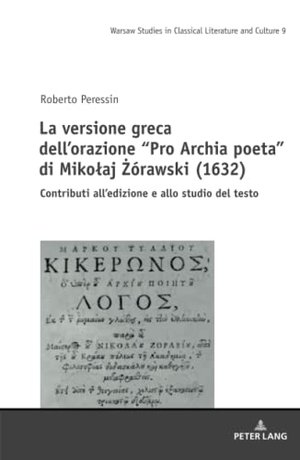Für statistische Zwecke und um bestmögliche Funktionalität zu bieten, speichert diese Website Cookies auf Ihrem Gerät. Das Speichern von Cookies kann in den Browser-Einstellungen deaktiviert werden. Wenn Sie die Website weiter nutzen, stimmen Sie der Verwendung von Cookies zu.
Cookie akzeptieren
Roberto Peressin
La versione greca dell¿orazione ¿Pro Archia poeta¿ di Miko¿aj ¿órawski (1632)
- Peter Lang
- 2020
- Gebunden
- 312 Seiten
- ISBN 9783631812105
Nel solco degli studi sul "greco umanistico", che negli ultimi decenni hanno conosciuto un notevole e fervido sviluppo, il volume presenta il caso di una rara traduzione in greco classico della celebre orazione "Pro Archia poeta" di Cicerone. Com'è noto, a partire da Petrarca e per generazioni essa costituì un'ode alla bellezza e al giovamento procurati dall'arte e dalla poesia. Lo studio, oltre a proporre il testo, accompagnato da un'approfondita analisi linguistico-filologico-stilistica, mira a far luce sul contesto storico- letterario in cui operò l'autore, il polacco Mikolaj Z¿órawski (1595-1665). Figura poco nota del primo barocco sarmatico, fu non soltanto astrologo e medico, ma altresì appassionato traduttore di Cicerone all'Accademia di Cracovia. In the wake of the studies on Humanist Greek, which have recently known a lively development, the volume presents the case of a rare Greek translation of Cicero's speech "Pro Archia poeta". As is known, starting from Petrarch and for generations the oration represented an ode to the beauty
Mehr
Weniger
zzgl. Versand
in Kürze